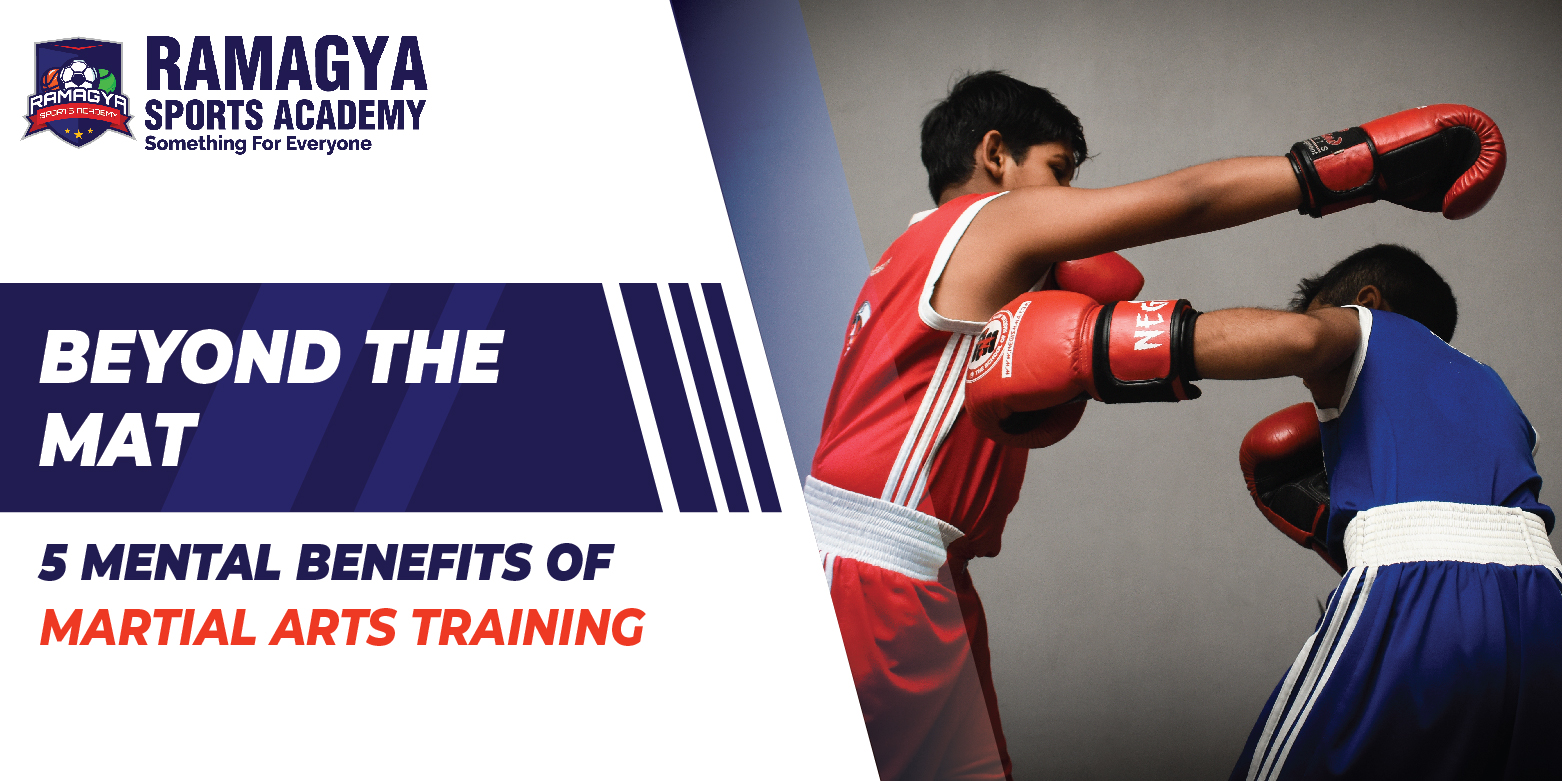
Contemporary Dance: Understanding its Wonders and Wellness Benefits
March 19, 2024
Shining Bright: Aagriya Yadav’s Gymnastics Success
March 22, 20245 Mental Benefits of Martial Arts Training
 Martial arts training goes beyond physical exercises, allowing practitioners an experience that is transformative and enriches both the body and the mind. “Beyond the Mat: 5 Mental Benefits of Martial Arts Training” delves into how practicing martial arts can improve your mental wellbeing. While many people recognize the physical advantages of martial arts, the mental benefits are often overlooked. Through disciplined training, anyone performing martial arts can develop life skills that go beyond the boundaries of the dojo and allow them to face the challenges of life with confidence.
From increased concentration and discipline to increased confidence and emotional resilience, martial arts training is a holistic method of personal growth when we study these mental advantages and insights into the transformational power of martial arts to transform people into confident, well-rounded, and resilient individuals.
Martial arts training goes beyond physical exercises, allowing practitioners an experience that is transformative and enriches both the body and the mind. “Beyond the Mat: 5 Mental Benefits of Martial Arts Training” delves into how practicing martial arts can improve your mental wellbeing. While many people recognize the physical advantages of martial arts, the mental benefits are often overlooked. Through disciplined training, anyone performing martial arts can develop life skills that go beyond the boundaries of the dojo and allow them to face the challenges of life with confidence.
From increased concentration and discipline to increased confidence and emotional resilience, martial arts training is a holistic method of personal growth when we study these mental advantages and insights into the transformational power of martial arts to transform people into confident, well-rounded, and resilient individuals.
Benefits of Martial Arts Training
- Enhanced Discipline: Improved discipline is one of the primary benefits of martial arts that come from martial arts classes. In the structured dojo, students become a part of the culture of concentration, consistency, and control. By sticking to a strict program of training to grasp complex techniques, you can develop the mental strength required to tackle life’s obstacles with firm determination. Through repetition of drills and activities, learners learn the importance of determination and the rewards that come from disciplined practices. The increased discipline goes beyond the training area and is reflected in every aspect of life. Be it academic efforts and professional plans or personal objectives, martial artists approach every challenge with a constant resolution to achieve the highest level of excellence. The discipline that is cultivated through martial arts can be an underlying force that shapes the way you think and make decisions. With discipline as a partner the students can find a way towards self-improvement and achievement by embracing obstacles as opportunities to grow. In essence, improved discipline is a motivation for personal growth, empowering people to reach their potential and live a life with focus, resiliency, and success.
- Improved Focus and Concentration: Focus and concentration improvement emerge as the primary mental benefits that result from martial arts teaching. In a lively environment, participants engage in activities that require persistent concentration on details and an increased perception of the surroundings. When doing the kata (forms) or participating in sparring, the participants are required to remain in the present moment and attentive to subtle signals and actions. Through regular practice, students develop the ability to eliminate distractions while remaining focused on the work in front of them. The improved concentration extends beyond the mat and is evident in all aspects of everyday life. Students frequently report improvements in efficiency in their professional or academic pursuits, mentioning their improved concentration as a major element in their achievement. Additionally, the mental discipline developed through martial arts training allows students to tackle problems with confidence and clarity and effectively solve problems while adapting to the changing environment. Each time they train, they build their mental abilities and enhance their ability to focus in the midst of the many distractions that life throws at us. In the end, martial arts function as a powerful tool for improving concentration and focus, enabling people to manage life’s challenges with a sense of purpose and accuracy.
- Boosted Confidence and Self-Esteem: Self-confidence boosts a significant mental advantage that results from training in martial arts. As students progress in their training, they acquire confidence in themselves that is based on their increasing mastery of their techniques and achievements. Every belt rank they achieve and each obstacle they overcome is evidence of their dedication and skill, which increases their faith in themselves. This confidence grows beyond the confines of the dojo, affecting every aspect of life. Martial artists typically carry themselves with confidence and poise, showing an air of confidence and determination. Additionally, the mental discipline developed through training gives practitioners the ability to face problems head-on, thereby boosting the confidence they have in their ability to face challenges. Each time a setback or success is faced, people build an increased sense of self-worth and spirit while embracing their strengths and talents. In the end, martial arts training can be an empowering journey to self-discovery. It allows people to fully realize their potential and confront every challenge with a sense of faith and determination.
- Stress Relief and Emotional Regulation: Relaxation and emotional control are the major benefits to mental health that result from training in martial arts. The physical severities of martial arts are a doorway for the release of emotional tension, allowing people to relieve tension and stress build up over their day. The harsh exercises trigger endorphins, which are the body’s natural mood boosters and promote a feeling of peace and wellbeing. Additionally, the discipline and focus developed during training can help people deal with stress better throughout their daily lives. Techniques like controlled breathing and mindfulness that are practiced during martial arts classes are effective in controlling emotions and encouraging mental clarity. When students learn to concentrate their energy into focused and deliberate action they gain a greater awareness of their emotional resiliency and control. The new ability to navigate and manage emotions not only improves mental health but also enhances connections with others and creates better-coping mechanisms. In the end, training in martial arts offers practitioners a full approach to managing stress that provides individuals with the knowledge and mental attitude to confront the challenges of life with calm and confidence.
- Importance of Karate: It is more than just physical skills. There is a lot of importance in karate in fostering mental well-being[1] through its practice. Karate’s disciplined approach imparts fundamental skills such as discipline, focus, and self-control. Through repeated training and adhering to the dojo’s etiquette, students build a mental discipline that goes beyond the mat and is evident in every aspect of their daily lives. Karate training also requires students to keep a high level of concentration and focus, which leads to increased concentration as well as mental clarity. The increased awareness doesn’t just enhance the ability to perform karate moves, but also results in increased concentration in professional or academic activities. Additionally, karate provides people with confidence and self-assurance as they move through belt ranks and conquer obstacles. This confidence boost extends beyond physical strength to include confidence in one’s mental strength and belief in self-confidence. The harsh training and determination that is required to master karate builds resilience, which allows practitioners to bounce back stronger after defeats and tackle life’s challenges with determination and courage. The mental benefits of karate go beyond the dojo, enriching students’ lives with invaluable abilities and qualities that are essential to happiness and success.
Conclusion:
In the end, “Beyond the Mat: 5 Mental Benefits of Martial Arts Training” provides a clearer picture of the massive effect of martial arts on mental health. Through disciplined training, students acquire a variety of psychological benefits that enhance their lives in numerous ways. From improved focus and discipline to a boost in confidence and emotional strength, martial arts training can be an excellent stimulant for personal development and self-discovery. When people advance on their journey through martial arts, they don’t just grow stronger but also grow into strong, confident, and empowered individuals. They become capable of tackling every challenge with determination. The psychological benefits of martial arts go beyond physical fitness and offer practitioners a path toward self-improvement as well as inner peace and satisfaction for themselves. When they embrace the mental aspects of martial arts instruction, participants embark on a transformational process of self-discovery that will lead to unlocking their potential and living happier lives at and away from the mat.Read our Article: Exercise in the Park or Gym? Making the Right Fitness Choice



